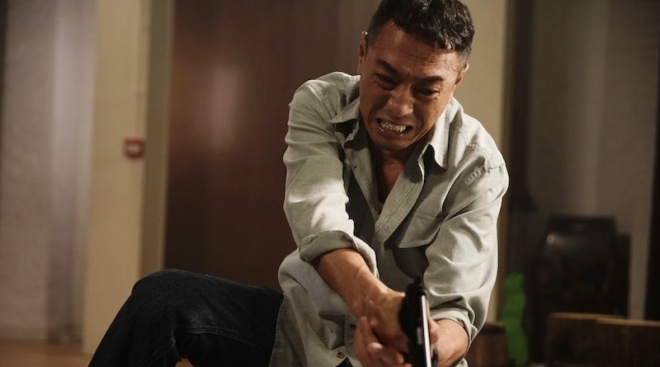It sure feels like forever waiting for Shadows <殘影空間> to finally arrive in cinemas after years of postponement. The psychological thriller made its debut at the Hong Kong Asian Film Festival in 2020 before it screened in several other film festivals the year after.
Well, I was looking forward to the movie not only because of its familiar but intriguing premise about a psychiatrist’s ability to enter a patient’s mind to look for an answer. But also because of the promising cast led by Stephy Tang, Philip Keung and Tse Kwan-Ho. First, the story: Stephy Tang plays Tsui, a psychiatrist who specialises in assessing one’s subconscious. The unconventional session works in the way that Tsui would sit face-to-face with her patient (Jennifer Yu in the earlier scene) and “enters” the mind to “see” what’s going on within the latter’s fragmented and traumatic mind. This leads to the use of surrealistic and abstract visual aesthetics, which director Glenn Chan does a good job of delivering them.
When a social worker named Chu (Justin Cheung) is responsible for a heinous triple-murder act before he attempts to commit suicide, the police detective-in-charge Ho (Philip Keung) collaborates with Tsui to help with the case. As Tsui learns more about Chu’s mental condition, she discovers he previously visited Dr Yan’s (Tse Kwan-Ho) clinic. Just like Tsui, Yan is also a psychiatrist who frequently mentioned that “humans are selfish”. The investigation also leads Tsui and Ho to seek other patients who received the same psychological treatments from Yan. Tsui suspects that Yan instigates his patients to commit murder, which sounds just as absurd as Ho having doubt about Tsui’s questionable psychological deduction.

The words “absurd” and “questionable” are best described for Shadows <殘影空間> as Glenn Chan along with screenwriters Chang Kai-Xiang and Mani Man Pui-Hing forgo the plausibility of the story’s murder-related events in favour of a vague, take-it-as-it-is psychological overtone. We never get a cohesive answer surrounding why Yan is capable enough to verbally abet his patient to commit murder. The same also goes for Tsui’s unexplained expertise to explore her patient’s subconscious as if she has a supernatural power of sorts. Frankly, the story is a mess and even feels like it was hastily written, complete with an oddly disconnected third act that caught me by surprise. Not in a good way but more of something that makes me go what-the-heck-am-I-watching-here.
While the story is mostly a disappointment, Shadows <殘影空間> still has its few worthwhile moments. The cast does what they can to elevate the otherwise superficial material with their overall dedicated performances. Stephy Tang delivers an engaging lead performance as Tsui while her co-star, Philip Keung equally shines as the tough police detective, Ho. Tse Kwan-Ho brings enough charisma to his solid supporting turn as Yan while cameo appearances, namely Justin Cheung and Jennifer Yu are just as praiseworthy in their respective roles as the social worker Chu and Tsui’s traumatic patient.
Glenn Chan, a Singapore-born director primarily known for his works in television dramas, has a flair for stylised and atmospheric visuals straight out of Hollywood-style psychological-thriller playbook. He also knows how to stage some effective set pieces including one of them revolving around a scene that takes place in a suspect’s home played by Ling Man-Lung in his quietly sinister turn as a hospital’s male nurse.
Too bad that Shadows <殘影空間> could only muster a half-hearted effort and it was pretty much a missed opportunity, considering the huge potential that the movie could have achieved instead.



Fully agree the screenplay is messy but performance especially Tang held what it could together